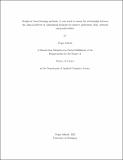Rough-set based learning methods: A case study to assess the relationship between the clinical delivery of cannabinoid medicine for anxiety, depression, sleep, patterns and predictability
Metadata
Afficher la notice complèteAuthor
Ashrafi, Negin
Date
2022-08-22Citation
Ashrafi, Negin. Rough-set based learning methods: A case study to assess the relationship between the clinical delivery of cannabinoid medicine for anxiety, depression, sleep, patterns and predictability; A Dissertation Submitted in Partial Fulfillment of the Requirements for the Degree of Master of Science in the Department of Applied Computer Science, University of Winnipeg. Winnipeg, Manitoba, Canada: University of Winnipeg, 2022. DOI: 10.36939/ir.202208251500.
Abstract
COVID-19 is an unprecedented health crisis causing a great deal of stress and mental health challenges in populations in Canada. Recently, research is emerging highlighting the potential of cannabinoids’ beneficial effects related to anxiety, mood, and sleep disorders as well as pointing to an increased use of medicinal cannabis since COVID-19 was declared a pandemic. Furthermore, evidence points to a correlation between mental health and sleep patterns. The objective of this research is threefold: i) to assess the relationship of the clinical delivery of cannabinoid medicine, by utilizing machine learning, to anxiety, depression and sleep scores; ii) to discover patterns based on patient features such as specific cannabis recommendations, diagnosis information, decreasing/increasing levels of clinical assessment tools (GAD7, PHQ9 and PSQI) scores over a period of time (including during the COVID timeline); and iii) to predict whether new patients could potentially experience either an increase or decrease in clinical assessment tool scores. The dataset for this thesis was derived from patient visits to Ekosi Health Centres in Manitoba, Canada and Ontario, Canada from January, 2019 to April, 2021. Extensive pre-processing and feature engineering was performed. To determine the outcome of a patients treatment, a class feature (Worse, Better, or No Change) indicative of their progress or lack thereof due to the treatment received was introduced. Three well-known supervised machine learning models (tree-based, rule-based and nearest neighbour) were trained on the patient dataset. In addition, seven rough and rough-fuzzy hybrid methods were also trained on the same dataset. All experiments were conducted using a 10-fold CV method. Sensitivity and specificity measures were higher in all classes with rough and rough-fuzzy hybrid methods. The highest accuracy of 99.15% was obtained using the rule-based rough-set learning method.

